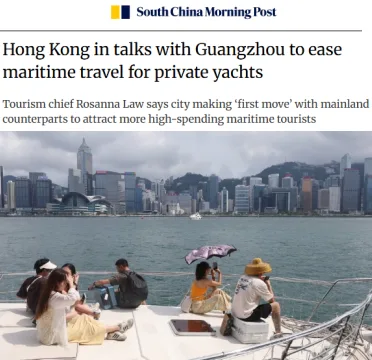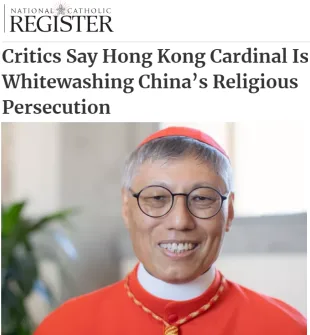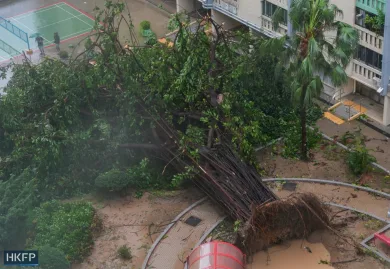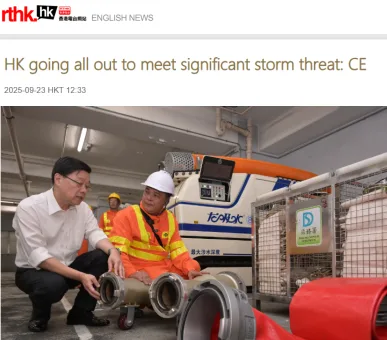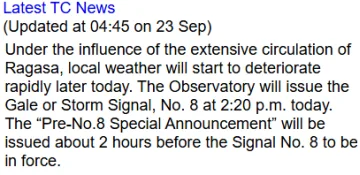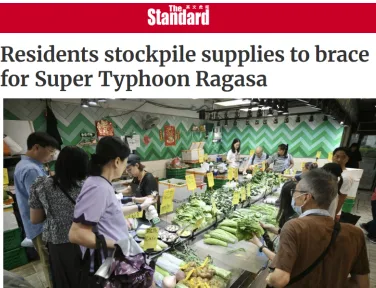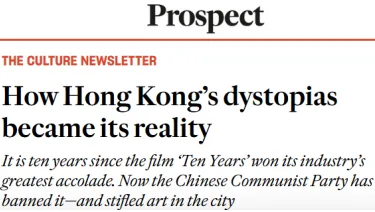The number of registered voters falls again…
The 2025 registers of electors, released on Thursday, showed a total of 4,138,992 people registered as voters in the city’s geographical constituencies – the only category of lawmakers open for the public to vote.
…Thursday’s figure represented a drop for the fourth consecutive year and a decrease of about 330,000 compared with the peak level in 2021, when Hong Kong had a total of 4.47 million registered voters.
Not sure whether I’m registered or not. I had a reminder, which I think I ignored. Either way, the people many of us would want to vote for are either barred from running or are simply in jail. If you state an opinion that people shouldn’t bother voting, the ICAC – the anti-graft police – can arrest you. So obviously I wouldn’t do that. (If your opinion is that they should vote, that’s OK. If you express an opinion that this is absurd, maybe you could be arrested for sedition, namely inciting hatred of the government. So I wouldn’t do that either.)
Some weekend reading…
Japan Times op-ed on the difficulties of invading Taiwan…
The island’s coastline is “remarkably unsuited for amphibious operations.” One study identified just 14 potential invasion beaches. Those landing sites would provide the terrain for one of the largest and most complex military operations in history, demanding a fleet comparable in size to that used by the Allies to land in Normandy on D-Day.
Once an invading force got on the beach — an accomplishment in itself — there would be little territory for staging forces as most of the land behind the landing zones is either rice fields that would swallow tanks and heavy transportation vehicles or cities, which create an urban fighting nightmare.
That unforgiving terrain assumes additional significance if the Taiwanese population is prepared to use it. And, the Stimson analysts note, “Chinese military planners believe Taiwan’s population will mount a formidable defense of their island.” According to a 2024 poll, two-thirds of the population would be ready to fight in their own defense.
History offers reasons to be cautious. The U.S. planned for an invasion of Taiwan during World War II, dubbed “Operation Causeway,” but decided not to proceed. As one military historian concluded, “the more they studied Formosa (Taiwan, pre-Nationalist takeover), the less they liked it.” U.S. President Franklin D. Roosevelt came to this conclusion, write the Stimson authors, even though the U.S. military “was approaching its absolute zenith of strength and experience,” a decision that “underscored the challenge.”
In contrast, the authors add, China’s People’s Liberation Army has “a mixed record” of amphibious operations.
Some in-depth pieces on China’s ‘involution’ problems. First a reminder from Michael Pettis…
…involution is just the most recent name for an old structural problem in China, that of excessively high GDP growth targets accommodated by increasingly soft budgets. The result is excess capacity throughout the economy.
That’s because as long as the GDP growth target is set above whatever growth the underlying economy can productively deliver, local governments are forced to deliver by overinvesting in whatever sectors are currently in favor, no matter how unproductive the investment.
Until China finds some way of raising consumption growth to at least 6-7 percent, it cannot rein in investment growth as long as it targets GDP growth rates of 4-5%. The only “solution” to excess capacity in one sector of the economy, in other words, is to shift it into another.
It’s worth remembering that the problem of involution was itself set off by the shifting of investment out of a massively overextended property sector. Much of this went to favored manufacturing sectors, which is why these are exactly the sectors suffering from involution.
A (paywalled) NYT op-ed sets the scene…
Competition in China is often far more cutthroat than in the United States. America has a handful of carmakers; China has more than 100 electric vehicle makers struggling for market share. China has so many solar panel makers that they produce 50 percent more than global demand. About 100 Chinese lithium battery producers churn out 25 percent more batteries than anyone wants to buy.
This forces Chinese manufacturers to innovate, but it also leads to price wars, losses and bad debt — and that’s becoming a problem.
China is heading toward deflation, the often catastrophic downward spiral of prices that sank Japan in the 1990s. Its leaders are blaming a culprit they call “involution” (“neijuan” in Mandarin), a term that has come to mean reckless domestic competition. They want to rein it in by browbeating companies into keeping prices steady and instructing local governments to scale back subsidies.
It won’t work. At best, those are temporary fixes for China’s more fundamental problem. Its economy relies so heavily on investment for growth, rather than consumer spending, that it produces enormous surpluses that wreck profits at home and provoke trade wars abroad.
…Longstanding policies that encourage excess supply remain untouched. Local officials are still measured by how well the economy grows and how quiescent their citizenry remains. That, in turn, means keeping local companies afloat to ensure the steady availability of jobs and tax revenue.
…So far, there have been only modest additions to the safety net, and Beijing is wary of reducing the state’s control over the economy and handing it instead to consumers. There is little reason to think this will change. China is likely to try to muddle through its anti-involution campaign hoping that importers, even the tariff-heavy United States, will swallow its excess goods.
A CSIS blog adds…
A central feature of this conversation centers around a criticism of competition based on price. At the corporate level, there are price wars in sector after sector, with companies slashing prices to reduce their inventories and fight for market share against their opponents. In the auto sector, BYD has been criticized by some as the source of price wars, with the charge that it wants to push as many competitors out of the market as possible. The same dynamic is visible in mobile phones, solar panels, e-commerce, and many other industries. The result is deflation as a whole … and in many industries…
…adopting more fundamental reforms would constrain the party-state’s authority. And although officialdom may be unhappy with “excess competition,” it may be willing to accept it as the cost of keeping its hands firmly in control of China’s economy.
The (paywalled) Overshoot Substack says …
So far, the impact of the domestic slowdown has been partly offset by soaring net exports. In 2024 the increase in China’s trade surplus contributed more to the reported growth rate than in any year since 19971. So far in 2025, the dollar value of China’s goods exports is rising about 6% a year, which is about the same as the full-year growth rate in 2024. But unlike last year, when spending on imports rose by 2.5% in January-August, or by 1.1% for the full year, so far in 2025, the dollar value of Chinese imports is down by 2.2%. China’s internal problems are therefore being dumped on the rest of the world. Businesses and workers elsewhere are earning less income because spending in China is too low.
That is a choice, and Chinese policymakers seem to be deliberately shifting at least some of the cost of that spending shortfall abroad through currency intervention. The Chinese banking system has increased its net foreign asset position by $360 billion since the end of 2023, leaning against pressure for the yuan to appreciate, and thereby reducing the international spending power of Chinese consumers while making Chinese exports look cheaper in foreign markets. In the short-term, that might be helpful in moderating inflationary pressures in manufactured goods, but the longer-term implication is deeply negative.
To see why, just consider what China’s top policymakers are saying about their domestic objectives. Besides increasing consumer spending—a longstanding official priority that has not yet translated into meaningful policy action—the focus is on getting companies to stop “excessive” competition for market share by slashing prices below cost. The official view is that this behavior, which has ostensibly been encouraged by local government production subsidies and an over-eager banking sector, deprives businesses of the ability to invest in research, technological upgrading, and quality control. The feared result is less innovation and lower incomes.
But if that is a problem for Chinese businesses competing with each other, it is also, presumably, a problem for non-Chinese businesses competing with Chinese ones—especially if they lack the subsidies and other supports needed to sustain production in the face of “irrational” price competition. From this perspective, the problem currently vexing China’s officials is simply the latest manifestation of the longstanding imbalances that for decades have plagued both China’s economy, and, by extension, the rest of the world.
…So far in 2025, total fixed asset investment (excluding rural areas) is just 0.5% higher than it was in January-August 2024. That is meaningfully slower than the full-year growth rate of fixed asset investment growth in 2024 (3.2%) or 2023 (3.0%), and much slower than the 5.4% growth recorded in 2019, the last full year before the pandemic. While it would be easy to pin this deceleration on the collapse in the housing market that began in mid-2021—growth swung from +10% in 2019 to negative 10% in 2022, 2023, and 2024—that is not the main explanation for what has happened in 2025, even if the pace of the real estate contraction has picked up to 13% so far this year.
For hardcore Pekingology/military geeks only – an in-depth essay on the Solo Wing Substack about purges in the PLA…
Through an examination of official announcements and other information, the outside world has learned that dozens of senior officers and cadres from various CMC departments, branches, theater commands, and military and aerospace enterprises have been purged or dismissed.
…The obsession with purges reaches back to Stalin, who eliminated swaths of Soviet cadres and nearly all senior commanders in the Red Army, elevating the purge into ideology and codifying it in his Short Course. Mao drew on this model in Yan’an, launching the Rectification Movement that systematically purged and indoctrinated cadres, soldiers, and intellectuals. Through denunciations, remolding, imprisonment, and executions, Mao secured his supremacy.
Communists may argue that purges ultimately strengthened combat power: Stalin purged, and in 1945 the Red Army planted its flag on the Reichstag; Mao purged, and in 1949 the PLA routed the Nationalists. Causality is debatable, but the victors prevailed. As Stalin is said to have told Mao: “The victors are not judged, nor can they be condemned. This is a universal axiom.”
Among much else, includes analysis of the ‘weather balloon’ that drifted over the US in 2023…
The episode derailed efforts to stabilize U.S.–China relations and exposed the PLA as highly stovepiped and poorly supervised. Such isolation and poor coordination have caused similar incidents before. In January 2011, Defense Secretary Robert Gates met Hu Jintao in Beijing ahead of Hu’s state visit to Washington. Hours before, the PLA conducted its first test flight of the J-20 stealth fighter. Hu, as CMC chair, seemed unaware when asked. Xi, who had just met Gates the previous day, was likely equally surprised. The timing fueled speculation that PLA insiders sought to sabotage the summit. Hu’s weak grip allowed the military to carve out autonomy through its monopoly on expertise. Just three months earlier, Xi had been elevated to CMC vice chairman—his final step toward being anointed successor. The episode showed him firsthand the dangers of a daredevil PLA acting on its own.
Fancy a free book on how the Atlantic slave trade affected Glasgow? The Glasgow Sugar Aristocracy: Scotland and Caribbean Slavery, 1775–1838 by academic Stephen Mullen. You can read it or download a PDF (or buy a real copy) here. I’ve been perusing it. Interesting!



